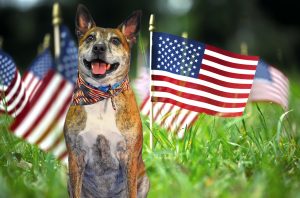Tip of the Quarter – Doggie Howlzer says, “Holidays present dangers to pets.”
Every holiday season, your home is sure to be filled with fun and holiday cheer. It is a time for celebration with friends and family, and that often includes our four legged friends. It’s important to consider your pet’s safety when decorating and preparing holiday meals. Here is a list of cautions to keep in mind when living or visiting with cats and dogs.
Food
While it may be tempting to feed your pets trimmings and scraps (even I, the good doctor, have been known to beg for a turkey leg!), please resist for the sake of your pet’s health. There are two groups of food to avoid feeding your pet. One is toxic foods which require an immediate visit to the veterinarian.
The other group is high-fat foods which can lead to pancreatitis (inflammation of the pancreas) and can affect both dogs and cats.
Toxic Foods
- Xylitol (a sugar substitute found in gum and candies) can cause death in even the smallest amounts
- Raisins, grapes – can cause kidney failure and even death
- Uncooked bread dough
- Onions
- Certain spices/oils – (sage)
- Chocolate (dark chocolate is more toxic than milk chocolate)
- Avocado (seed only)
High Fat Foods
- Turkey (dark meat)
- Buttery/Fried Dishes
- Stuffing (if cooked with butter or whole milk)
- Gravy
- Casseroles (depending on the fat content)
- Certain Desserts
Holiday Plants
Holiday plants may be mistaken for food by our pets. Side effects include gastrointestinal irritation, vomiting, and diarrhea as well as more life-threatening conditions. Be especially cautious of the following if you choose to display these plant species in your home:
- Lilies (all varieties, including Easter Lily and Amaryllis): these can cause acute renal (kidney) failure in our feline friends. It is very important if your cat eats any type of Lily plant that you seek immediate veterinary care.
- Mistletoe
- Poinsettias
- Holly
- Pine tree needles and sap
- Christmas Cactus
CLICK HERE to see The ASPCA’s list of the Top 5 Holiday Toxins for Pets.
Decorations
Many pets find holiday decorations very appealing. However, this can lead to various types of injuries.
- Ornaments: Pets may think these are toys and ingest (eat) them and/ or choke on them. Glass ornaments can cause cuts on paws and to the mouth and digestive tract, if swallowed. They can also get stuck in the GI tract and need surgical removal.
- Tinsel/Ribbon/Garland/Wrapping Paper: Pets often find tinsel and ribbon quite intriguing. This is especially true for cats. If ingested, any of these items can get trapped in the intestines. This requires immediate veterinary attention and can be life threatening if not addressed.
- Potpourri: The festive scent can entice pets to investigate. Make sure containers are covered or not accessible. If ingested, potpourri can cause GI upset (vomiting and diarrhea).
- Christmas tree water: Many pets love to drink the water in the tree stand. Be cautious if you use chemicals in the water to preserve the life of your tree as these can be harmful to your pets.
Lights/Candles/Electrical Cords
The glow of lights and candles add a warm touch to dark, wintry nights. Our furry friends, however, may see things differently.
- Candles or Fireplaces: Any type of flame candle or fire can cause a burn risk to our furry friends.
- Wires/Electrical Cords: Pets may think lights or cords are toys. They may chew them and experience an electrical shock (which can be life-threatening), or create a fire risk.
- Presents: Some holiday gifts may contain small parts, batteries, or buttons that can be hazardous if swallowed.
With careful planning and preparation, the holidays can be fun, festive, and safe for all…and to all a good night!
Doggie Howlser, M.Dog



